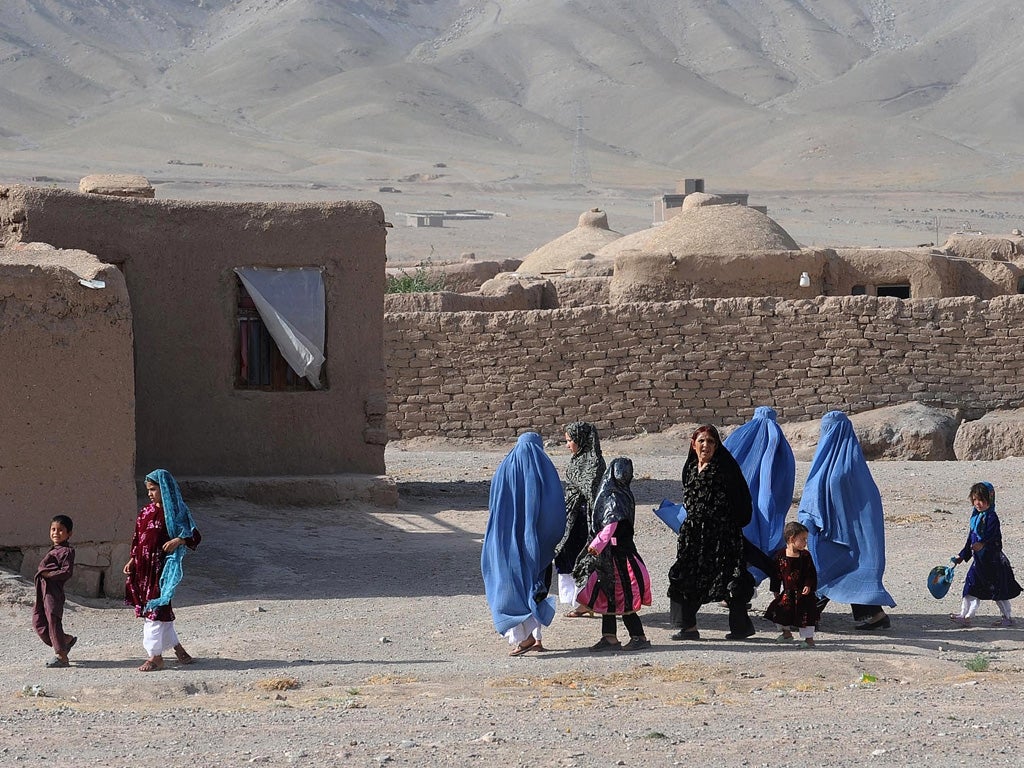The problem with the Taliban peace talks is not women, it’s their absence
Although women and girls are disproportionately affected by conflict, their experiences and instrumental contribution to peace are often overlooked

Women must be present! So said the parliamentary commission on banking standards, which has today called for a better gender balance at the heart of investment banks in order to prevent future economic crises caused by risk-obsessed male-dominated trading floors.
Food for thought, coming the day after talks between the Taliban and the US were announced – talks where the crucial issue of women’s rights is said to be on the agenda, but will any women be on the invite list?
The stated aim of the talks: ‘Peace and reconciliation’, would undoubtedly be a preferable state for Afghanistan’s war-battered citizens after decades of conflict, but what is the scope of these peace negotiations, and what compromises are being offered? Indeed, who is being compromised?
Just yesterday a bomb detonated near the Afghan Independent Human Rights Commission injuring 30 and killing three. Then overnight Taliban insurgents launched a deadly ambush on an American convoy killing four. Peace is urgently needed. However it appears the talks may have stalled before they started with the Afghan government threatening, this morning, to boycott. Whether the refusal to sit down at the table is permanent, or just a delay to the schedule, it remains unclear whether a political peace deal hammered out in Qatar by the Taliban, US and Afghan officials will ever be fully representative of the interests of all Afghans.
Amnesty has been campaigning for the UK government, as a member of NATO and diplomatic ally of the Afghanistan government, to do all in its power to support Afghan women in their fight to have their rights protected and promoted throughout the peace process. The campaign has received widespread parliamentary backing, with scores of MPs pledging their support and a number of select committee reports emphasising the importance of women’s rights to sustainable peace.
This last point is important because although women and girls are disproportionately affected by conflict, their experiences and instrumental contribution to peace are often overlooked. UN Security Council Resolution 1325 dictates that women’s experience of conflict (being different to that of men) and their participation in post-conflict processes is essential to ensuring sustainable peace. Women’s participation is not only fair and right (there can be no justification for excluding 50% of the population from decision making which will affect their lives as much as those of men), it is advantageous.
Nevertheless, women have been strikingly absent from peace negotiations worldwide. The UN Women’s review of 31 major peace processes between 1992 and 2011 revealed that only four per cent of signatories, 2.4 per cent of chief mediators and nine per cent of negotiators were women. However when women have been involved, they have achieved striking successes, not only in contributing a vital perspective to the analysis of conflict, but also through providing effective strategies for peace building.
In Afghanistan women make up 27% of MPs (which, by the way, is more than in the UK) thanks to quotas ensured through the Constitution. But of the 70 member High Peace Council charged with negotiating peace, only nine are women. In fact Afghan women’s organisations have consistently voiced concerns that women have been marginalised in key decision-making processes. When I was in Afghanistan last year, Afghan women told me personally of their fear that without meaningful representation in the peace negotiations the priority concerns of women and girls will not be fully reflected in any peace agreement and, as a result, their rights will be traded away.
This fear could be well founded given that the US has reportedly dropped a number of pre-conditions to peace talks and will now only “seek a commitment…[to] recognise women’s rights”. But the rights of Afghan women do not belong to the US any more than they do to the Taliban and are not theirs to negotiate with or trade away.
Afghan women have a right under international law, including the Convention to Eliminate All Forms of Discrimination Against Women and Security Council Resolution 1325, to participate in decision-making processes which will affect their lives. Moreover their experience and understanding, not just of the conflict but of all aspects of Afghan life, will be invaluable in achieving a genuine and sustainable peace for all Afghans.
When parties gather in Qatar to determine the legacy of this costly and protracted conflict, it is vital that women’s rights are on the table, but vital too that women are sitting at it.

Join our commenting forum
Join thought-provoking conversations, follow other Independent readers and see their replies